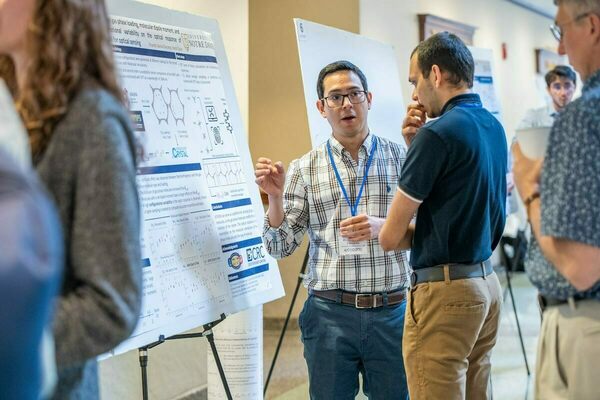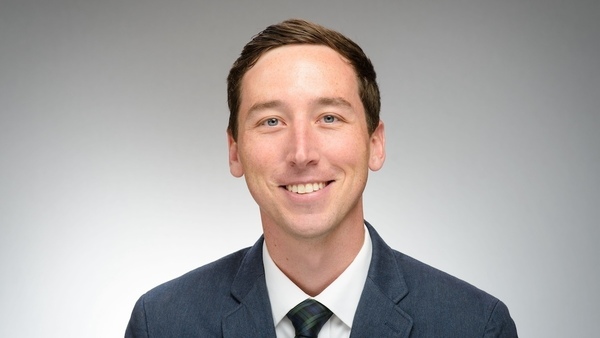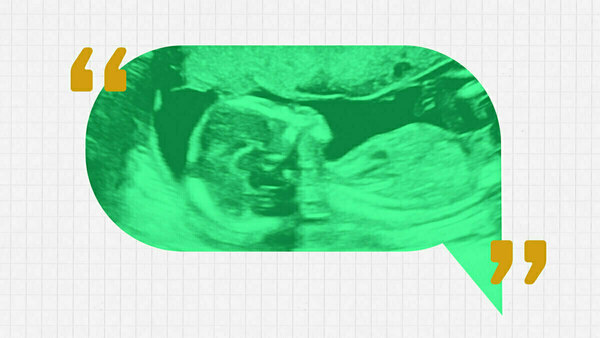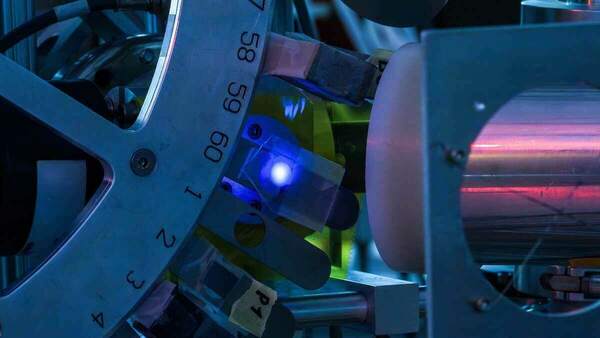Notre Dame hosts major international artificial intelligence and machine learning conference
Experts from 22 different institutions of education and research located in 7 different countries gathered at the University of Notre Dame (South Bend, Indiana, USA) last week for a flagship workshop of the Centre Européen de Calcul Atomique et Moléculaire (CECAM). From July 7 to 9, 2025, the participants—who are among the world's top researchers in the development and application of artificial intelligence (AI) and machine learning for chemistry and materials discovery—gathered for presentations, a poster session, and discussions focused on machine learning advances for the prediction of molecular and material properties.
“This was a unique opportunity to bring together so many experts in the field from all over the world right here at Notre Dame,” said Yamil Colón, associate professor in the Department of Chemical and Biomolecular Engineering. “Our students were able to participate in the poster sessions and share ideas with world-class peers. This week was a great moment for all of us to get together, to network, and to share science.”
The workshop marks only the second occasion that CECAM has convened in the United States. Founded in 1969 and headquartered in Lausanne, Switzerland, CECAM’s US-Central node was established at the University of Chicago in 2023, with Notre Dame as one of its founding partners. With 21 nodes encompassing 29 institutions from 17 countries, CECAM meets regularly to share findings and best practices in computational science organized around a timely theme.
“Machine learning, the focus of this workshop, is revolutionizing the field of computational predictions of molecular and material properties. It has enabled recent advances like foundation models and machine learning interatomic potentials,” said Colón, who served as one of the workshop’s organizers.
In recent years, machine learning has become a powerful tool for predicting the properties of chemical structures and engineered materials without the need for wet lab experiments, which can be time-consuming and hazardous. Advances in computer engineering have allowed researchers to develop algorithms that can extract chemical attributes and predict properties from atomic coordinates and feature vectors. Experts have also devoted much effort to compiling large property datasets, which are critical for the training and standardizing of new frameworks.

To date, machine learning models have been successfully applied to the prediction of reactive, physicochemical, and pharmacological properties of molecules and materials. Researchers have also implemented machine learning in spectroscopy, which enables the automated characterization of a variety of chemical spectra, including infrared (IR), ultraviolet and visible light (UV/vis), and nuclear magnetic resonance (NMR).
“Machine learning advancements open the door for accelerating chemical and materials characterization in the immediate future,” explained Colón. “With a new understanding of physical, chemical, and molecular phenomena that were once unattainable, there is high potential for the development of novel materials to address issues in energy, water security, and healthcare, as well as a new generation of drug development."
“This workshop facilitated a great exchange of information on the latest developments in this fast-moving research area,” said Ed Maginn, associate vice president for research and Keough-Hesburgh Professor in the Department of Chemical and Biomolecular Engineering, who helped organize the workshop. “I’m very excited that Notre Dame was able to host such an exceptional group of scholars for a rich week of international collaboration in this crucial field.”
The workshop was made possible by financial support from CECAM as well as the following Notre Dame entities: Berthiaume Institute for Precision Health; Center for Research Computing; College of Engineering; College of Science; Department of Chemical and Biomolecular Engineering; Department of Chemistry and Biochemistry; Institute for Latino Studies; Lucy Family Institute for Data & Society; ND Energy; NDnano; Notre Dame Research; Scientific Artificial Intelligence Initiative.
To learn more about machine learning and artificial intelligence research at the University of Notre Dame, please visit the Center for Research Computing, Lucy Family Institute for Data & Society, and Scientific Artificial Intelligence Initiative.
Contact
Erin Fennessy / Writing Program Manager
Notre Dame Research / University of Notre Dame
efenness@nd.edu / +1 574-631-8183
research.nd.edu / @UNDResearch / linkedin.com/company/undresearch
Photos
Photos by Angelic Rose Hubert.
About Notre Dame Research
The University of Notre Dame is a private research and teaching university inspired by its Catholic mission. Located in South Bend, Indiana, its researchers are advancing human understanding through research, scholarship, education, and creative endeavor in order to be a repository for knowledge and a powerful means for doing good in the world. For more information, please visit NDR's website or NDR's LinkedIn.
Latest Research
- Doctoral student Joryán Hernández to receive inaugural Sr. Dianna Ortiz, OSU Peacemaker AwardJoryán Hernández, a peace studies and theology doctoral student at the University of Notre Dame, was tapped as the first-ever recipient of the Sr. Dianna Ortiz, OSU Peacemaker Award from Pax…
- The Institute for Educational Initiatives at Notre Dame Launches Free Math App to Help Teachers Strengthen Students’ Understanding of Numbers and OperationsThe Number Sense Assessment app gives educators quick, research-based insights to target instruction and improve student outcomes Notre Dame, IN — Researchers at the Institute for Educational Initiatives at the University of Notre Dame have launched…
- U.S. Senator Todd Young on bridge-building in Congress and Notre Dame’s role in strengthening civil discourseThe University’s home state Senator discusses the importance of fostering common ground, on Capitol Hill and on campus
- Notre Dame researchers to shed light on the Brazilian Amazon, conflict resolution, microplastics, and moreNotre Dame Research (NDR) has selected five awardees of the Research and Scholarship Program – Regular Grant (RSP-RG) and five awardees of the Research…
- First impressions count: How babies are talked about during ultrasounds impacts parent perceptions, caregiving relationshipPsychologist Kaylin Hill studied the impact of a parent’s first impression of their baby during an ultrasound exam. The words used by the medical professional to describe the baby (positive or negative) influence how the parents perceive their baby, relate to them after they're born and even how that child behaves as a toddler. The research has broad implications for how we train medical professionals to interact with expectant parents, as well as how we care for parents during the perinatal period when they are most susceptible to depression.
- Researchers at Notre Dame detect ‘forever chemicals’ in reusable feminine hygiene productsWhen a reporter with the Sierra Club magazine asked Graham Peaslee, a physicist at the University of Notre Dame, to test several different samples of unused menstrual underwear for per- and polyfluoroalkyl substances (PFAS) in 2019, the results fueled concern over chemical exposure in feminine hygiene products — which ultimately ended up in a $5 million lawsuit against the period and incontinence underwear brand Thinx. Then in 2023, the New York Times asked Peaslee to test 44 additional period and incontinence products for PFAS, a class of toxic fluorinated compounds inherently repellent to oil, water, soil and stains, and known as “forever chemicals” for their exceptionally strong chemical and thermal stability. Measurable PFAS were found in some layers of many of the products tested — some low enough to suggest the chemicals may have transferred off packaging materials, while others contained higher concentrations, suggesting the chemicals were intentionally used during the manufacturing process. In the meantime, another group of researchers published a study that found PFAS in single-use period products, leading Peaslee and his lab to widen their investigation into all sorts of reusable feminine hygiene products — often viewed as an eco-friendly option by consumers. Now, the results of that study have been published in Environmental Science & Technology Letters.













